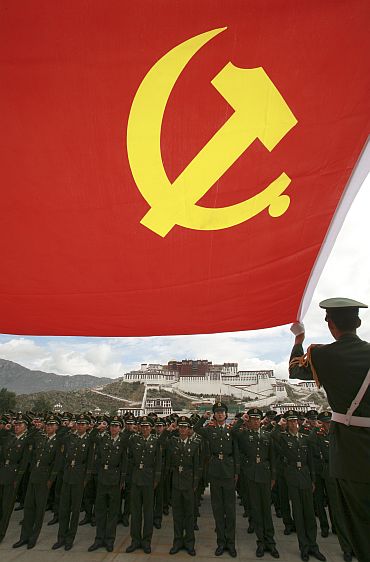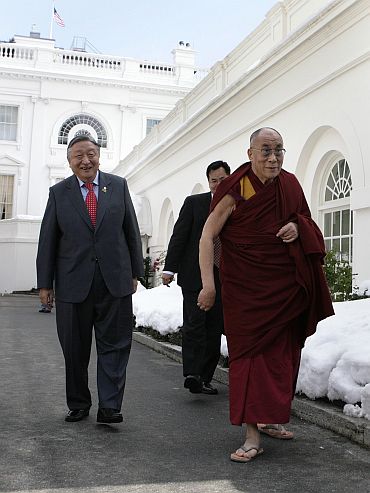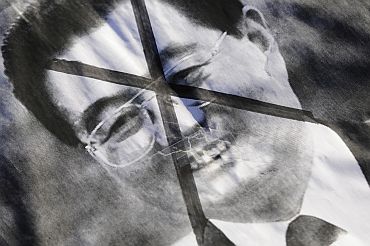 | « Back to article | Print this article |
Why China is growing tenser by the day
The situation in the Chinese-controlled Xinjiang region of China and in the so-called Tibet Autonomous Region continues to haunt the leadership of the Communist Party of China, which has been observing the 90th anniversary of its formation this month, and the People's Liberation Army, which has been observing the 60th anniversary of its occupation of Tibet, says senior analyst B Raman.
For the last four weeks the Chinese authorities have considerably stepped up security in Xinjiang and Tibet to prevent any mass protests. July is a sensitive month for both regions -- for Xinjiang because it marks the first anniversary of the violent incidents of last year and for Tibet because it marks the 60th anniversary of the occupation of Tibet by the PLA. The reluctance of the Uighurs and the Tibetans to join in the celebrations of the 90th anniversary of the CPC has been an added cause for tension.
More by unintended coincidence than by design, the visit of Hillary Clinton, the US Secretary of State, to India from July 19, fell on the 60th anniversary of the occupation of Tibet by the PLA.
Click NEXT to read more...
China worried over the American role
Before her departure from Washington for New Delhi, two worrisome developments for the Chinese relating to Tibet had taken place in US. Firstly, despite Chinese objections, US President Barack Obama received the Dalai Lama, who happened to be on a visit to the US on the eve of the 60th anniversary of the PLA's occupation of Tibet, in the Map Room of the White House for a discussion to underline continuing US interest in the human rights of the Tibetan people.
Secondly, of equal concern to the Chinese was the reported visit of His Holiness to the Washington headquarters of the US State Department funded Radio Free Asia, which was started under the Bill Clinton administration to make broadcasts,inter alia, to the people of Tibet and Xinjiang.
The Chinese remember the role played by the US-funded Radio Free Europe and Radio Liberty in encouraging political dissidence in the erstwhile USSR and other communist countries in East Europe.
Radio Free Asia has been allegedly broadcasting to the people of Xinjiang and Tibet not only the latest news about developments in their region to which they are denied access by the Chinese censors, but also instructions on how to circumvent the various curbs imposed by the Chinese authorities on microblogging and other social media networks to prevent a copy-cat emulation of the Jasmine Revolution of Tunisia and Egypt by the people of not only Xinjiang and Tibet, but also other parts of China.
CPC wary of a 'Jasmine effect'
The Chinese authorities, who view the recent mass demonstrations in support of electoral reforms in Kuala Lumpur as inspired by the Jasmine Revolution, take seriously the danger of the Jasmine effect creating political dissidence in China during the year of its celebration of the 90th anniversary of the CPC.
In view of these factors, there has been palpable nervousness in both Xinjiang and Tibet resulting in many preventive arrests and seizure of the belongings of many suspected political dissidents.
While these measures have not so far led to the outbreak of any violence in the Tibetan areas, protests staged by the Uighurs against the preventive arrests, which have been taking place for the last two weeks, led to a major clash between the protesting Uighurs and the Chinese security forces on July 18 resulting in the death of over 20 persons -- the majority of them Uighurs plus at least two members of the security forces.
According to reports from reliable Uighur sources, the trouble started in the central bazaar of the Hotan town in the Xinjiang province when the Chinese security forces opened fire on a group of Uighurs demanding the release of arrested relatives.
Enraged by this, the protesters attacked a nearby police station and took some policemen hostage. The Chinese security forces used more force to drive the protesters out of the police station and rescue the hostages taken by them.
The Chinese authorities have depicted the incident as a terrorist attack on the police station without giving details of the initial incidents in the central bazaar. The situation is tense all over Xinjiang, but there have been no reports of violence from other parts of the Chinese-controlled province.
'The Dalai Lama is an old man'
The Chinese authorities have noted with concern an interview given by the Dalai Lama in the US in which he was quoted as saying that it was he and not the CPC who would determine the selection process for choosing his successor after his death. They view this as a pre-emptive attempt by him to deny legitimacy to any selection process initiated by the CPC and to prepare the ground for a protest by his followers against any selection process imposed on the Tibetan people by the Han-controlled CPC.
The Chinese have sought to counter the attempts of the Dalai Lama to influence his succession in two ways. Firstly, they have sought to discredit the Dalai Lama by projecting him as an old man, who does not know what he is talking about. Secondly, the "People's Daily", the newspaper of the CPC, has come out with a detailed article on July 20 on how the successor of a Dalai Lama has to be chosen according to Tibetan Buddhist traditions.
The "People's Daily" article said: "The Dalai Lama recently showed special attention to his reincarnation, which is understandable as he is already an old man. The problem is that the more he talks, the crazier he looks, and the further away he is from his religion. He is like an actor or a politician, often leaving people wondering about the credibility of his words."
Chinese Vice President Xi Jinping, who is expected to succeed President Hu Jintao, visited Lhasa on July 19 to participate in celebrations of the 60th anniversary of the "liberation" of Tibet by the PLA.
Speaking at a public function on that occasion, he said: "Tibet serves as an important national security screen for the country. It also constitutes an important ecological security screen, a major base of strategic resources reserve and a major production area of special highland agro-produce. It is home for the preservation of a unique culture of the Chinese nation and a major international tourism destination."



